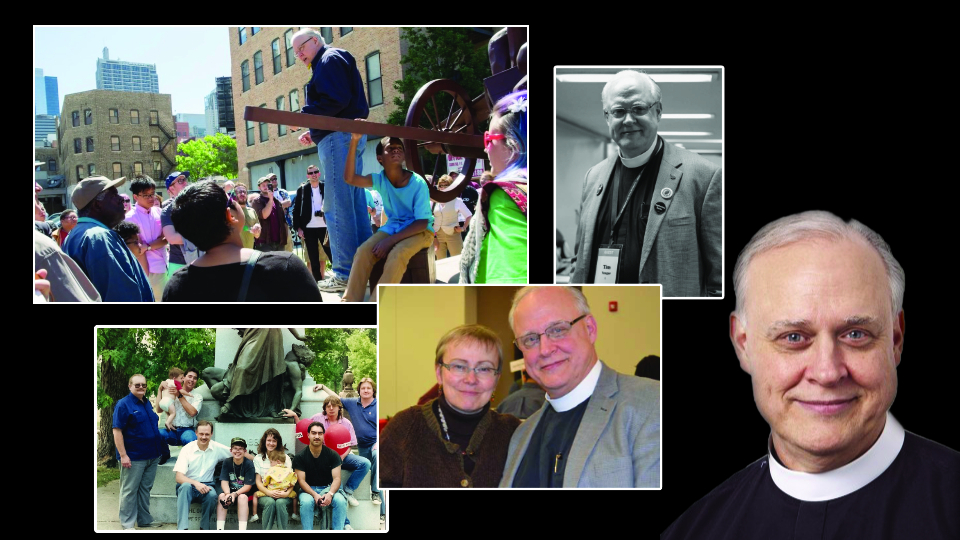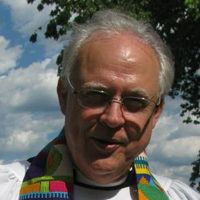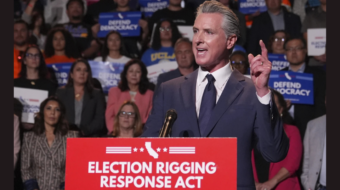
On April 2, 2024, Tim Yeager—a man known and beloved by many People’s World readers—died in England, where he lived with his wife, Caroline Moores. Born in Iowa, Tim lived a life committed to justice, equality, and peace. He was known on both sides of the Atlantic for blending the social consciousness of progressive Christianity and the commitment to struggle found in Marxism.
Radicalized in the peace movement during the U.S. war against Vietnam, he went on to become a progressive journalist, a union organizer with the Legal Service Workers, an officer of that union at the national level with the UAW, and pastor of a church on Chicago’s West Side. Tim was also for many years an organizer for the Communist Party USA in Iowa. He served on the party’s National Committee and was chair of its Religion Commission.
In 2014, he and Caroline moved to the U.K., her home country. There, he became a leader in the Episcopal Church.
Tim was also a writer for People’s World for decades. The article we share below appeared in the paper on Sept. 23, 2000. It is based on the text of a sermon that Tim delivered at an event called “Labor in the Pulpit 2000,” which brought together union and faith leaders from all around the country, including hundreds of union locals and churches, synagogues, and mosques. It was jointly sponsored by the National Interfaith Committee on Worker Issues and the AFL-CIO.
A full obituary will appear in our pages soon, along with details for a planned memorial service in the U.S.
Union leaders take to the pulpit on Labor Day

People’s Weekly World, Sept. 23, 2000
Labor Day Homily
St. Sylvester’s Roman Catholic Church, Chicago, Illinois.
By Tim Yeager
September 3, 2000
My name is Tim Yeager, and I am the recording secretary of UAW Local 2320. Most UAW members work in the auto industry. Our local represents staff at the Legal Assistance Foundation of Metropolitan Chicago, Hull House Association, Heartland Alliance, and other legal services and human services non-profit organizations in this area, and similar organizations around the country.
I am honored to have been invited to speak to you today on behalf of the American labor movement. For me, it is a special treat. You see when I was a boy, I wanted to be a member of the clergy. As fate would have it, I became a union organizer instead.
But standing here with you, in this house of worship, I am reminded that there really isn’t much difference between those two vocations. Now, I would have to say that this beautiful church is a lot prettier than most union halls. And the choir is better.
But when you study the Judeo-Christian tradition, when you study the Old Testament prophets and the teachings of Jesus, one message emerges from all the rest. We as a people are called to be active in the building of the Kingdom of God in our world, here and now.
When Jesus taught his disciples to pray, he taught them to pray that the Kingdom of God would be established on Earth: “…Your Kingdom come, Your will be done ON EARTH, as it is in heaven.” Later he said, “Seek ye first the Kingdom of God and its justice, (and all the other things will follow).”
And what is this Kingdom of God that we are called upon to build? One only needs to read the parables and teachings of Our Lord for the answer, but it is the same answer you find throughout the history of the Hebrew people.
The Kingdom of God is a kingdom of social and economic justice, where the hungry are fed, the naked are clothed, those who are in prison are visited, and widows and orphans are cared for. But beyond even that, it is a society based upon a fair distribution of land and the wealth created by human labor. And to obtain such a Kingdom, the God of Our Fathers takes the side of the poor every time.
One of the earliest pieces of legislation was, of course, the Ten Commandments. This includes labor legislation: “On the seventh day thou shall perform no labor.”
When I teach collective bargaining techniques to our members, I often ask them when the earliest recorded example of collective bargaining was. And I get answers about the textile workers strike in New England, the shoemakers in Philadelphia, etc. They are usually surprised when I pick up the Bible and tell them to turn to the Book of Genesis. And I tell them to read the story of Moses and the Hebrew slaves in Egypt.

What do you find there? Well, you find that the Hebrews were employed in various occupations in the construction industry, brickmakers, masons, and laborers. And Moses goes to Pharaoh and makes his first demand, which was a three-day weekend to enable the Hebrews to go out of town to worship their god. He was trying to get the first Labor Day weekend!
And if you recall the story, you will recall that Pharaoh not only denied the demand of Moses but retaliated against the Hebrews, taking away their straw, while insisting upon their maintaining the same level of production. It was the first example of industrial speed-up in history. Of course, things escalated, and eventually, the slaves prevailed and were released from bondage, taking not only their wages, but tools, cattle, and other property obtained from their former employer.
After they obtained their freedom, they passed legislation to govern themselves in the new land. One of the earliest pieces was, of course, the Ten Commandments. This includes labor legislation: “On the seventh day thou shall perform no labor.”
Other progressive legislation adopted by the Hebrews included a measure by which debts were forgiven every seven years and persons who sold themselves into bondage to pay their debts were released. Every 50 years, land was returned to the families of original owners, who had lost their land during hard times. This was the “Jubilee Year,” otherwise known as the “Acceptable Year of the Lord.”
At the very outset of his ministry, Jesus went into the synagogue at Nazareth and, reading from the Book of Isaiah, proclaimed this same message of social and economic liberation:
“The Spirit of the Lord is upon me because He has anointed me to preach good news to the poor. He has sent me to proclaim release to the captives and recovery of sight to the blind, to set at liberty those who are oppressed, and to proclaim the Acceptable Year of the Lord.”
And from there, Jesus went across the land preaching the gospel and organizing a movement. And whom does he recruit for this movement? Who joins and becomes part of his immediate circle?
Of course, Jesus himself is a carpenter. But look at the others: James, his brother, would also have practiced his father’s trade and would have been a carpenter, but there are fishermen, a low-level civil servant or two, reformed prostitutes, farmers … Any kings or princes? Any Officials of any consequence? Any high-level clergymen? No.
In fact, there is the rich young ruler who asks to join, but Jesus tells him that he must first give everything he has to the poor before the young man can join the Kingdom of God movement. And the rich young ruler goes away sorrowfully because he had a lot of possessions and didn’t wish to part with them. Then Jesus says, “It is easier for a camel to enter through the eye of the needle than for a rich man to enter into the Kingdom of Heaven.”
The early church was a movement of working people, who saw in the message of Jesus the hope for a better, more just society. And it was not an easy struggle for them. Some were crucified, and some were thrown to the lions. But they persisted, and prevailed.
Labor unions are organized by workers to seek better wages and working conditions on their jobs. Just like the Hebrews of old, working people today find it necessary to join together to have an effective voice. And just like Moses and the slaves in Egypt, they sometimes must stop their labor to get the Pharaoh’s attention. The struggle, in many ways, has been the same for more than 3,000 years.
But labor unions are, at their best, a movement for social and economic justice. Over the years, we have worked to bring about a shorter workweek, so that workers can have rest and time with their families, to increase the minimum wage for all working people, whether they are in unions or not, for unemployment insurance, social security, free public education, environmental safety, health care, the elimination of child labor, and against racism and other forms of oppression.
Just like the Hebrews of old, working people today find it necessary to join together to have an effective voice. And just like Moses and the slaves in Egypt, they sometimes must stop their labor to get the Pharaoh’s attention.
But the struggle is not always an easy one. Workers seeking to organize themselves often find resistance and retaliation by the owners and employers, both here in our country and abroad. Although it is illegal for an employer to retaliate against a worker for union activity, it does happen, and due to the slowness and weakness of labor law enforcement, it can take a long time to obtain justice.

In today’s reading from the Letter of James, we are called to be “doers of the word, and not merely hearers who deceive themselves.” As Christians, we are called to act when we become aware of injustice and to support those who are seeking justice around the world and in our own communities. In the labor movement, we call that “Solidarity.” And this is a powerful force for good if we would only use it.
How can people of faith help workers?
We can act to ensure that working people in our communities are paid a living wage for their labor and are provided with family health coverage.
People of faith can participate in boycotts of hostile employers, attend rallies of striking workers, meet with employers to encourage them to settle fair contracts, and lobby legislative bodies to pass legislation that will protect workers’ rights and promote their well-being.
Workers engaged in struggle should share information about their struggles with the others in their congregations and community organizations. Don’t keep your troubles a secret. Bring them into your church, into your union, to seek the help of your brothers and sisters. And together, we can seek to obtain justice in each situation.
This parish participates in activities with the Interfaith Committee on Worker Issues, so you have already taken a big step to greater cooperation and solidarity with the struggles of working people. And you are active in support of the Day Labor Organizing Project.
For my union, I pledge to you that we will respond to issues of concern that you raise. And I hope that I may contact you when our union needs support as well. Above all, I look forward to working together with you in the struggle to bring about the Kingdom of God “on Earth, as it is in heaven.”
Amen.
We hope you appreciated this article. At People’s World, we believe news and information should be free and accessible to all, but we need your help. Our journalism is free of corporate influence and paywalls because we are totally reader-supported. Only you, our readers and supporters, make this possible. If you enjoy reading People’s World and the stories we bring you, please support our work by donating or becoming a monthly sustainer today. Thank you!










